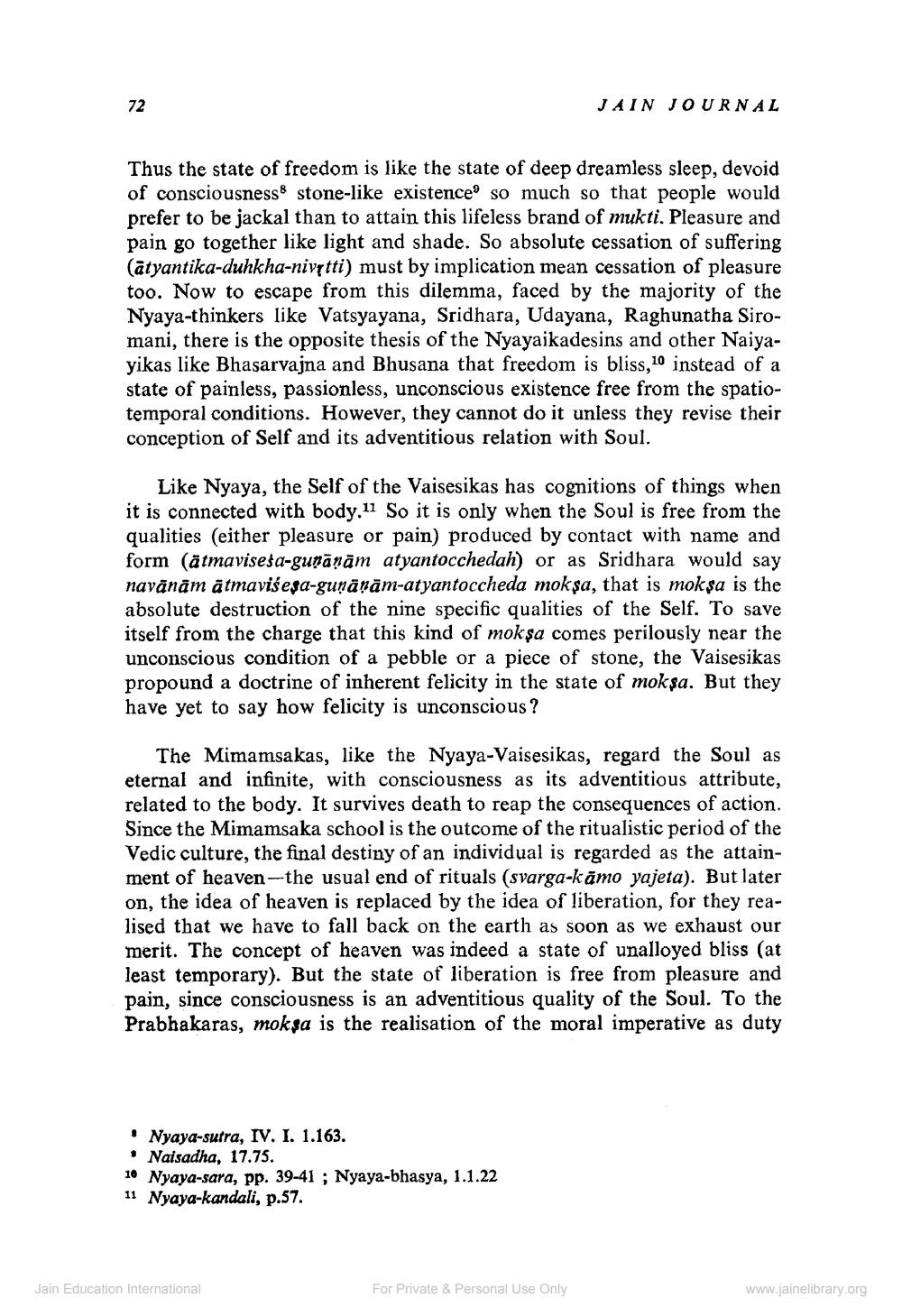Book Title: Jain Journal 1990 01 Author(s): Jain Bhawan Publication Publisher: Jain Bhawan Publication View full book textPage 9
________________ JAIN JOURNAL Thus the state of freedom is like the state of deep dreamless sleep, devoid of consciousness8 stone-like existence so much so that people would prefer to be jackal than to attain this lifeless brand of mukti. Pleasure and pain go together like light and shade. So absolute cessation of suffering (atyantika-duhkha-nivýtti) must by implication mean cessation of pleasure too. Now to escape from this dilemma, faced by the majority of the Nyaya-thinkers like Vatsyayana, Sridhara, Udayana, Raghunatha Siromani, there is the opposite thesis of the Nyayaikadesins and other Naiyayikas like Bhasarvajna and Bhusana that freedom is bliss, 10 instead of a state of painless, passionless, unconscious existence free from the spatiotemporal conditions. However, they cannot do it unless they revise their conception of Self and its adventitious relation with Soul. Like Nyaya, the Self of the Vaisesikas has cognitions of things when it is connected with body. 11 So it is only when the Soul is free from the qualities (either pleasure or pain) produced by contact with name and form (ätmavisesa-gunāņām atyantocchedah) or as Sridhara would say navānām atmaviseșa-gunāņām-atyantoccheda moksa, that is moksa is the absolute destruction of the nine specific qualities of the Self. To save itself from the charge that this kind of moksa comes perilously near the unconscious condition of a pebble or a piece of stone, the Vaisesikas propound a doctrine of inherent felicity in the state of moksa. But they have yet to say how felicity is unconscious ? The Mimamsakas, like the Nyaya-Vaisesikas, regard the Soul as eternal and infinite, with consciousness as its adventitious attribute, related to the body. It survives death to reap the consequences of action. Since the Mimamsaka school is the outcome of the ritualistic period of the Vedic culture, the final destiny of an individual is regarded as the attainment of heaven--the usual end of rituals (svarga-kāmo yajeta). But later on, the idea of heaven is replaced by the idea of liberation, for they realised that we have to fall back on the earth as soon as we exhaust our merit. The concept of heaven was indeed a state of unalloyed bliss (at least temporary). But the state of liberation is free from pleasure and pain, since consciousness is an adventitious quality of the Soul. To the Prabhakaras, moksa is the realisation of the moral imperative as duty . Nyaya-sutra, IV. I. 1.163. • Naisadha, 17.75. 10 Nyaya-sara, pp. 39-41 ; Nyaya-bhasya, 1.1.22 11 Nyaya-kandali, p.57. Jain Education International For Private & Personal Use Only www.jainelibrary.org www.jaineliPage Navigation
1 ... 7 8 9 10 11 12 13 14 15 16 17 18 19 20 21 22 23 24 25 26 27 28 29 30 31 32 33 34 35 36 37 38 39 40 41 42 43 44 45 46 47 48 49 50 51 52 53 54 55 56 57 58 59 60 61 62 63 64 65 66 67 68 69 70 71 72 73 74 75 76 77 78 79 80 81 82
